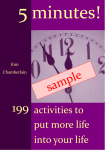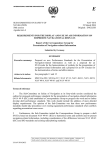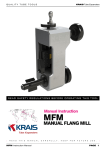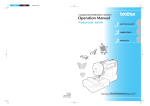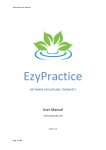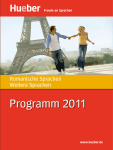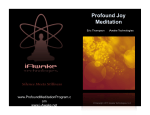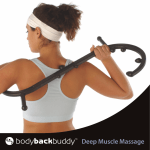Download here - Kim Chamberlain
Transcript
5 minutes! Kim Chamberlain 199 activities to put more life into your life 1 5 minutes! 199 activities to put more life into your life Copyright © 2012 by Kim Chamberlain This e-book is copyright. Apart from any fair dealing for the purpose of private study, research, cri"cism or review, as permi$ed under the Copyright Act, no part may be reproduced by any process without wri$en permission from the author. Author details: Wri$en and published by Kim Chamberlain www.kimchamberlain.com First published: June 2012 2 Contents Introduc"on 4 People and rela"onships 7 Fun and pleasure 10 Personal development 18 Skills and knowledge 26 You and your body 33 Something prac"cal 43 Answers 46 List your own ac"vi"es 48 Notes 50 Index 52 3 Introduction What can you do in 5 minutes? Quite a lot actually. You could give a powerful presenta"on; write an important le$er to a loved one; spend precious "me genuinely listening to your child. And if you spend 5 minutes doing something regularly over a period of "me, the difference could be enormous. 5 minutes a day taking "me out to de-stress could be extremely beneficial; 5 minutes a day with a skipping rope could make a big difference to your level of fitness; 5 minutes a day taking small steps to expand your comfort zone could bring untold benefits. Of course, you might just want to spend 5 minutes doing something fun or light-hearted, like reading the cartoons in the paper; si=ng with your feet up and a nice hot drink; or cha=ng to a friend. These are important too. This book gives many sugges"ons for how you can use 5 minutes. It could be a spare 5 minutes while wai"ng for the evening meal to cook; a 5 minute break between tasks; a regular planned 5 minutes daily, or any other situa"on where you have 5 minutes you could spend doing something useful. Many of the ac"vi"es are low-cost or no cost. For some of the ac"vi"es you may need to do some prepara4 "on beforehand. 5 minutes prac"sing a musical instrument isn’t going to go very far if you have to spend "me digging your guitar out of the wardrobe and working out if it’s tuned or not; 5 minutes dipping into a book won’t amount to much if you are in the office and the book is in your car in the car park … in the next street. If it is going to be a regular ac"vity it pays to have the appropriate items ready! Ac"vi"es that require some form of prepara"on beforehand are marked with a star. How to use this book ‘5 minutes!’ is split into chapters containing ac"vi"es of a similar nature. Within each chapter are categories, each with five sugges"ons for 5 minute ac"vi"es. Of course, you don’t have to prolong the ac"vity for exactly 5 minutes if you finish early, nor do you need to stop aEer that amount of "me. If you feel you want to carry on, then by all means do so! Some ac"vi"es may take several 5 minute sessions, for example "dying up your inbox or "dying up a room. In these cases you may like to set a "mer for 5 minutes each "me. The length of some ac"vi"es may be dependent on other people, for example if you ‘Call a friend who laughs easily’ it may be a friend who is unable to limit their conversa"on to 5 minutes! 5 The topics may trigger ideas for other ac"vi"es you would like to include so there is space for you to write your own, at the back of the book. There are also blank pages for the ac"vi"es where it’s suggested you write or make notes. Enjoy! Kim Chamberlain 6 People and relationships Relaonships • Contact someone you haven’t been in touch with for a while to rekindle your friendship. You could email, text, write, phone, send a card, connect on a social media site… • Send someone a thank you message. It could be for any reason, for example for providing a service; for offering a listening ear; for helping you when you needed it; simply for being a great friend • Have a quick mee"ng – standing up - with your family where everyone puts in their ideas for a fun day out. Choose one and decide on the day you will do it • With your family members, choose a dinner plate that is different from any others you might use, and earmark this as the ‘special plate’. When someone does something special, they will have their meal served on this plate • Make posi"ve comments on people’s social media pos"ngs. A few words, even infrequently, can nurture a rela"onship connec"on Marriage & relaonships • Write some ‘love notes’ for your partner and leave them in unexpected places, for example in their pocket, in the coffee jar, taped to the sun visor of their car, on the bathroom mirror, in their shoe 7 • Re-live a happy memory by discussing it with your partner, such as what a$racted you to each other in the first place; the proposal; your wedding day • Get out your diaries and book several date nights • If your partner is feeling stressed, listen to their concerns and then give them a head and neck massage • Send each other a text message saying ‘I love you because…’. Do it every day for a week, giving a different reason each "me Children, young • Help your child to learn a simple rhyme that you learnt as a child • Make up a story. Ask them to contribute, and include their ideas in the story. For example “What do you think the bunny’s name is?”; “And what do you think the girl did next?” • Pretend that you are the child and they are the parent, and act out a fun scenario together • Create a quick and simple dress-up by making a crown out of paper, a robe from a towel or small blanket, and using a s"ck as a wand • Walk round the house and count 10 red items Children, older • Sit down with them and ask if there is one thing you could do that would be of help to them • Discuss their main interest or hobby. Really take an 8 interest • Look round their bedroom with them and see if there is an item they could sell • Ask them to teach you something simple • Play a card game. The loser has to sing a song in as out -of-tune voice as possible Share • Share something that is special to you – that you don’t normally share - with someone else. It could be a bar of chocolate, your favourite wine, a gadget, use of your car etc. • Share ‘silent "me’ with someone. Simply sit with someone and listen to the surrounding noises; or when you are out in nature, sit and silently observe and listen • Have a family mee"ng where you each briefly share your views on a par"cular issue • Share kindness. Write down as many ways as you can, in 5 minutes, the kindness you could share with others. For example could you offer to babysit; "dy a neighbour’s garden; clean out your parent’s garage; etc. • Go onto a forum or suitable blog and share some of your knowledge, for example "ps for health, finance, travelling, paren"ng … 9 Fun and pleasure Fun • Play Twenty Ques"ons. One person thinks of an item or subject. They can say whether it is ‘Animal, Vegetable or Mineral’, or can give a category, such as TV programme, Sports person, Food. The others have to guess what this item or subject is by asking up to 20 ques"ons. The responses to the ques"ons can only be ‘Yes’ or ‘No’, or ‘Yes’ ‘No’ and ‘Maybe’. • Sing along to your favourite song, preferably with others, as loudly as you can • Have a pillow fight, in a safe environment • Have a running race. Remember to do some warm up exercises first • Play a quick game on the Wii, Xbox, or PlaySta"on Books • Choose a book that you feel happy to part with. Tape a note to the front of the book saying ‘This book is freely available for anyone to read. Please take it, and when you have finished reading, leave it somewhere for another person to use’. Leave it in a suitable place, such as in a café, on public transport, at the train sta"on • Pick out one of your factual books, such as a dic"onary, user’s manual, or fact book, turn to page 15 and see if you can learn something new 10 • Choose two or three books and see exactly how they are laid out. For example check what is on the spine, what is on the front cover, what is on the "tle page, where the dedica"on page comes, if there is a contents page or index, and so on • Choose the oldest and newest books you possess. Study them to see what changes have occurred in book produc"on over the years • Choose a map book or a book containing a map of a real place, and study it to see the interes"ng place names and the layout of the area. Alterna"vely look at a detailed map of a place you are familiar with and see if there are any places you didn’t know were there Drawing • Draw your family tree • Find a colouring-in picture, or draw one, or find one in a book, or print one off. Colour it in using only one colour. There are various colouring techniques you can use, for example light shading, heavy shading, poin"llism (using small dots), ver"cal lines, cross hatching (short strokes ver"cally, crossed with horizontal strokes), placing a textured item underneath the paper and shading over it, etc. • Find a colouring-in picture, or draw one, or find one in a book, or print one off. Colour it in using as many colours as you like 11 • Study a small, simple item such as a book, cup or flower and do a simple sketch of it. Next "me either aim to do it be$er, or con"nue with the sketch • Copy a picture using a grid technique. Find a picture, draw a grid over it, then draw a blank grid the same size, and copy the picture into the blank grid. For example: Sing • Choose a song you don’t know the lyrics to, print them off and sing along • Choose a suitable song and sing a duet with someone • In a group, sing a round. For example ‘Row row row your boat’, ‘Frere Jacques’, ‘London’s burning’ • Sing the lyrics from one song to the tune of another. It will be easier if you can print off the ‘alterna"ve’ lyrics so you don’t get tempted to sing the original lyrics. Great fun, especially when done with a group! 12 • If you have a home karaoke machine, sing along in pairs, in groups, on your own... Nature • Sit amongst nature, close your eyes and completely relax • Watch clouds, preferably with someone else, and work out what shapes they make • Use a poetry book or search online and read a poem about nature, or write a poem about nature • Re-pot a pot bound plant • Go outside and collect as many types of leaves as you can in 5 minutes. In the next 5 minute session, see how many of the leaves you can iden"fy Memories • Look over some old photographs, ideally with someone else • Think about the best day of your life. Recall the colours, the sights, the sounds, the smells, the environment, the people. Especially remember your emo"ons • Pick out an item you have had for many years. Think back to the "me you acquired it and what has happened to it since • Share your best childhood incident with a friend • Create memories by wri"ng a diary. There are many ways to write a diary. Your diary could be simply to create memories for yourself, a diary that no one else 13 will see, or it could be to create memories for others in the future. There is no right or wrong way to write a diary. Some ideas to consider: • write it in the first person • write it as a chronological overview of your day • write down your reflec"ons on what is happening in your life • include how you feel and say why • include photos, "ckets, le$ers • do some drawings • include poems • write down your plans, hopes, daydreams, prayers • make it colourful Show • Show someone how to do something. It could be anything that can be done in 5 minutes, for example how to fold a napkin; how to do a mail merge; how to count to five in another language • Show your apprecia"on of good customer service you have received. If you are s"ll in the place, ask to speak to a supervisor to pass on your compliments. Alterna"vely write a brief note, send an email or make a phone call complimen"ng a person or an organisa"on • Show someone a photo of something that is special to you, and explain why 14 • Show someone one of your favourite books and give a brief synopsis of it • Show your support for a worthy cause. Take the first step by deciding on a cause you would like to support and finding out more about it, for example ge=ng their contact details; subscribing to their newsle$er; calling and asking for informa"on. Alterna"vely start checking out what local, na"onal or interna"onal community organisa"ons or causes there are. For example your local voluntary service, or search online for a list of non -profit organisa"ons Silly Some"mes it’s good to stop what you’re doing and do something silly! • Get everyone in the house to put on their most ridiculous combina"on of clothes, and then take a group photo • Sing along to a song, making up silly words to it • Find a photo of someone in a magazine or newspaper and draw silly things on them – a moustache, big ears, etc. • Play ‘Silly Stories’ with a group of people. Get something to write on that all people can see, such as a whiteboard, flipchart of large piece of paper. Two people stand up, with one ac"ng as a prompter. The prompter asks the other player to start telling a story, for example ‘My last holiday’. As they talk, the prompt15 er writes a word or short phrase on the board that isn’t related to their topic, such as ‘sausages’ ‘alien invasion’ ‘Albert Einstein’. The player has to adapt their story to include this word or phrase. The prompter writes a couple more words or phrases and the player has to use them while trying to con"nue the original story. AEer a minute another player has a turn; and so on • Have several slips of paper. On half of them write the names of animals. On the other half write an adjec"ve or emo"on. Put the slips into two separate bags. One person at a "me picks out one from each bag - the name of an animal and an adjec"ve - and has to mime it, while the others guess. For example you may have to mime ‘a pompous snail’ ‘a bored chimpanzee’ ‘an intellectual giraffe’ Word games Answers are at the end • Make as many words of four or more le$ers as you can from the word NEWSPAPER. Avoid using proper nouns and plurals • First and Last Le$ers. Can you think of 10 words where the first and last le$ers alternate? For example, if the first word is 'REALLY', the next word would need to start with Y and end with R, the third word would then start with R and end with Y again, and so on. Example: REALLY – YOUR – RAY – YONDER – RARITY – YEAR – RATIFY – YOUNGER – ROMANY – YORKER 16 Aim to choose words without ‘difficult’ first or last le$ers, for example F, I, J, V or Q, X, Z Words to try include ARM, SHOT, ENTER, POOL, HINT, EVEN, MAIL, SOUP, COUNT, RACING • Alphabet conversa"on. You need at least one other person for this. The aim is to tell a story, with each person saying a sentence that begins with a le$er of the alphabet. Firstly choose a story topic, for example ‘Planning a holiday’. The first person starts off with a sentence beginning with the le$er A. For example “Are you going to book the hotel?” The next person says the following sentence star"ng with the le$er B. For example “By the beach or in the town?” The next person says a sentence star"ng with the le$er C, and so on un"l all 26 le$ers have been used • Ten Words. Think of a word: • with six le$ers star"ng with G • with two-syllables ending in LL • that rhymes with teacher • that starts and ends with the same two le$ers • with 10 le$ers ending in E • with four le$ers that looks the same in the mirror • beginning with Q that has three syllables • that has more than five le$ers and ends in X • that has six le$ers in alphabe"cal order • with three Ks in it • Choose any three le$ers and think of ten adjec"ves star"ng with each of the le$ers 17 Personal development Personal Development • Make a decision to do something that takes you out of your comfort zone today - or once a week - or every day for a year! Choose ac"vi"es that don’t endanger you. Write down the top five ac"ons you are going to start off with, along with the dates you will do them – in the very near future. The more you confront your fears, the more your confidence can build and the more you get out of life. Can you decide to make an appointment with the den"st; agree to speak at an event; go to a party on your own; jump off the diving board at the pool; ask someone out on a date; leave your job; spend the day on your own; pick up a spider and look at it…? • Think of an area of your life you would like to improve on for example your finances, public speaking, losing weight, improving your marriage or rela"onship. Go online and order a book about it • It is said that successful people ask be$er ques"ons, and as a result get be$er answers. What issue are you dealing with at the moment? Work out useful ques"ons you can ask yourself about it, or chat with someone and ask them to ask you ques"ons • Unsure of what your real passion is? Start the process of finding out by taking a piece of paper and drawing a line down the middle. On the leE hand side write down 18 things you love. Anything, no ma$er how big or small, especially those things you do when you don’t have to and those things you dream about. On the right hand side write down things that challenge you or you find difficult. The items you put here are in your life to challenge you and build strength of character. The items on the leE hand side are what you are here to do. Perhaps as a job, career, voca"on, hobby or interest. This exercise may take more than one session • Start a Gra"tude Diary, where you spend 5 minutes a day wri"ng down all that you are grateful for. It is said that when you think about all the things you are grateful for in your life then the law of a$rac"on dictates that you will a$ract more just like them. Having an a=tude of gra"tude can help boost your feelings of self-esteem, op"mism and mo"va"on as well as having a posi"ve impact on your health, rela"onships, and work Stress Busters • Sit down or lie down and do NOTHING • Meditate. You can do this silently, or use medita"on music, or play a guided medita"on. You can find some online if you don’t have a CD or similar. If choosing your own medita"on, choose one you know, or read one and prac"se it, or ask someone to read one out to you • Go for a jog. Remember to do some warm up exercises first 19 • Watch an entertaining YouTube video • Do a puzzle, such as a crossword or Sudoku, or 5 minutes’ worth of a jigsaw puzzle Daydream • Imagine you have won a million on the lo$ery. Work out exactly what you would do with it • Imagine you could change your physical appearance to whatever you wanted. What would you look like? • Imagine you could make a major beneficial change in the life or circumstances of one of your family members. What would you change? • Imagine you could make a major change to one of the issues facing your country. What would you change and how would you do it? • If an enormous change were to take place in the world, such as an end to poverty, hunger or war for example, how would the world be? Contribuon • Who do you know who is lonely and could do with some company? Can you work out a way to help? • Make your street more a$rac"ve for all – sweep up outside someone else’s house; put a plant at the base of a street lamp; pick up li$er from the kerbside • Plan a way to contribute financially. Can you give a percentage of your income to a worthy cause? Some people arrange to have dona"ons taken from their salary 20 • Speak to one of your neighbours and ask if they would like to help you organise a street barbeque • When you are out at the shops, how can you spend 5 minutes giving to others? Can you give a smile to people; give a compliment to the shop assistant; give money to people collec"ng for worthy causes; give your car park "cket that has "me remaining on it to someone else ... Plan • Plan how you can make the best use of the next 24 hours. Write down all the ac"vi"es that have to be done, and then brainstorm the ac"vi"es that could be done. Choose the most important you can achieve in the "meframe • Draw up a plan for your evening meals for the week • Make a note in your diary of birthday dates for family and friends along with dates when you are going to buy and/or send cards and presents • Decide on a purchase you would like to make but cannot yet afford, then work out a plan as to how you will achieve it. It can be any type of purchase, from something inexpensive, through to a large purchase such as a house • Draw up an escape plan in case there is a fire in your house. This may take more than one session. Get a leaflet from the fire service or local council or search online for ‘Fire escape plan’ and draw up your plan 21 Discover something new • When out walking, driving or shopping, take a slight detour to a different street or different shop that you haven’t been to before. See what you no"ce • When food shopping, look at different shelves or different parts of the shop and buy a type of food you haven’t tried before • Go to the library and into a sec"on you don’t normally go to. Borrow an interes"ng book • Try an unusual combina"on of drink, either alcoholic or non-alcoholic. There are many combina"ons you could choose • Fancy a new occupa"on? Do an internet search on ‘unusual occupa"ons’ ‘different careers’ or ‘interes"ng occupa"ons’. You might be inspired! Contemplate Contempla"on involves focusing your thinking for a period of "me. It can help you to gain more understanding of an issue, to feel calmer, or to gain insight into life. Before you start, take a moment to se$le and feel calm. • Look at an item such as a plant, flower, tree, pain"ng, ornament or piece of jewellery and fully appreciate its beauty • Look at the sky and contemplate the vastness of the universe 22 • Think about the amazing journey that long-distance migratory birds make • Contemplate all the posi"ve aspects in your life. What quali"es have you been endowed with? What quali"es have you developed? Which people are in your life that you appreciate? What have you contributed to others? Appreciate everything you have • Think about what people might say about you at your funeral. What are some of the posi"ve aspects? What might some of the nega"ve aspects be? What can you do in the "me you have leE that will turn some of those nega"ve aspects round? Frustraon To deal with frustra"on: • Burn off energy by doing something physical, such as going for a run, skipping, kneading some dough • Use a journal to write down how you feel, and write the journal regularly. Or write what you would really like to say to someone in a le$er or email to get it off your chest, but don’t send it • Stop; take a deep breath; take a break; remove yourself from the situa"on; have a cup of tea; go for a brisk walk • Rant to a trusted friend or partner for 5 minutes • Listen to music, whichever type will get you into a good frame of mind – calming music, fun music, rock … 23 Imaginaon “Imagina"on is more important than knowledge” Albert Einstein. • Think of a character in a novel, film or programme. Now imagine what their life is like in detail. This is what the writer will have done to be able to create them. What were their parents like? What was their schooling like? What kinds of book would they read? What is in their wardrobe? What kinds of food do they eat? What are their views on religion? And so on • Take a piece of paper and a few types of pens or pencils. Pick up a pen, close your eyes and draw random shapes. Then turn the paper slightly and using another pen draw more random shapes. Con"nue for a while. When you have finished, imagine that it is a very expensive work of art by a modern ar"st. Now give an explana"on of the deep meaning of the work to an imaginary poten"al buyer • Imagine what could be a simple sugges"on to reduce the level of poverty in third world countries • Think up a new inven"on that could be an alterna"ve to using an umbrella • Start a simple story either in your head or wri$en down, star"ng with ‘When I leE the house in the morning I met …’ and con"nue the story. Each "me you do this exercise, imagine a different storyline 24 Observe When you are in a variety of situa"ons, stop for 5 minutes and be an impar"al observer. See how things work and what people do. See if you can no"ce a pa$ern, a rhythm or a par"cular way that things happen. • When at a networking event, observe how people come together, how long they interact for, and how they split up • Watch a debate or a poli"cian being interviewed on TV and observe how people deal with tricky ques"ons • Observe how people go into or come out of a large event • When watching a film, be aware of the mise-en-scène, the arrangement of everything that appears on camera—the set design and props; the ligh"ng; the loca"on; the costume designs and colours; the ac"ng style • Do some people watching, unobtrusively. For example sit in a café with a drink and possibly some reading ma$er, and observe people going past on a busy street or in a shopping area. It’s interes"ng to watch body language, people’s interac"ons, the speed that people walk at, what they are carrying, what their clothes say about them, how children behave ... 25 Skills and knowledge Increase your skills • Prac"se a musical instrument. Keep it easily accessible so that you can simply pick it up and start. Keep accessible anything else you might need, such as books, music sheets, "mer. Prac"se a short sec"on at a "me. (Note this type of prac"ce is aimed at those who want to learn for fun. More prac"ce is needed for those who want to take it seriously) • Learn a simple card trick. Find one in a book or look online. There are a number on YouTube. Over "me you can progress from very simple tricks to harder ones. An easy one to start off with: Take two cards from the top of the deck. Make sure you hold them together carefully so that it looks like you only took one card. Show it to the other person. Then put the two cards back on top of the pile and this "me take only the top card and place it at the bo$om of the pile. Then turn over the top card and it appears to be their card • Spelling. Think of a word you have difficulty spelling. Find the correct spelling and prac"se wri"ng it out. Then prac"se including it in different sentences. Write this word on a s"cky note and a$ach it to the bathroom mirror. Leave it there "ll you feel confident you can spell it. You may like to check online for a list of common spelling errors to see if there are any you need to be aware of. Common errors include such 26 words as accommoda"on, beginning, commi$ee, definitely, development, government, independent, necessary, separate, successful • Improve your balance. Physical balance is a learned skill and if we don’t con"nue to prac"se it we are likely to become dependent on supports such as s"cks and hand rails as we get older. Here are three simple balance exercises: • Stand on your toes. Do it in front of a mirror, for at least 30 seconds at a "me • Stand on one leg. Do it in front of a mirror, aiming for 15 seconds at a "me on one leg, then 15 seconds on the other. Keep your head straight, and look into the mirror • Stand on your heels. Take off your shoes and rock back on your heels and hold your stance. As the weight will be on your heels, keep focusing to avoid "pping over backwards • Prac"se a foreign language. Simple ways to increase your skills include: watch short videos; read children’s books or comics; arrange to call or email a fluent speaker of the language on a regular basis; make up flash cards of useful words and carry them with you; listen to music and see if you can pick up any of the lyrics; memorise irregular verbs; ask someone to read out 10 words while you write them down then check the spelling; write out conjuga"ons of verbs 27 Increase your knowledge • Ask someone to share their knowledge on a topic you are not familiar with • Sit in front of a computer, click in the Internet search box, close your eyes and type le$ers randomly. Follow some of the links it brings up • Obtain a book on a topic you know li$le about. Read or dip into it in 5 minute bursts • Choose a topic you know li$le about and watch a short You Tube video on it • Read a page of an encyclopaedia Train your Brain Answers are at the end • Think of as many countries as you can that have five le$ers in them • Write down the le$ers A to Z, one underneath each other. Now write down 26 girls’ names, beginning with each le$er of the alphabet • Choose 10 single-digit numbers. Add them up. Then mul"ply them (e.g. 7 x 6 x 3 x 9 etc.). Work these out without using a calculator • Look at 10 items around you. Now memorise them in alphabe"cal order • Get a pack of 52 cards. Shuffle them. Time yourself while pu=ng them into the four suits in the right order 28 from Ace to King. Do it again, aiming to improve on your "me Language • Think of someone you know whose main language you don’t speak or don’t speak well. Learn some phrases in their language. Use a phrase book, dic"onary or go online. You could keep a phrase book handy and learn a couple at a "me • Teach yourself to say ‘Hello’ in three new languages • Think of some foreign words or phrases in use in your own language, the original meaning of which you are not aware, and find out their original meaning. For example vis-à-vis, schmaltz, hara-kiri, ad lib • Learn the meaning of an unusual word or two. Look in the dic"onary or do an internet search on ‘learn a new word’ or ‘unusual words’. For example, sublunary, syzygy, pelf, talipot, theremin • We store all the words we know, not in any random fashion in our head, but in word-groups called ‘Seman"c Fields’. For example we would probably store the words happy, laughing, amusing, smiling, funny, and so on, in the same seman"c field. For everyday speaking it’s useful to be able to become familiar with our seman"c fields, expand them, and retrieve words from them easily and quickly. One way to do this is prac"se thinking of as many words you can in a par"cular seman"c field. Choose a word or concept and see how many words or phrases you can think of in the 29 same seman"c field. For example Large; Clever; Red; Beau"ful; Words that describe chocolate; Words that describe Australia Coordinaon • Try juggling two items such as bean bags or balls. If you can already do this, use a larger number items • Do a simple drawing such as a house or Christmas tree on a piece of paper. Now get a small mirror and hold it at right angles to the paper so that you can see the drawing. Looking only in the mirror trace over your drawing • Sit down. Clap your hands twice and stamp your foot once. Do this five "mes. Then clap your hands three "mes and stamp your foot twice. Do this five "mes. Now clap your hands once and stamp your foot twice. Do this five "mes. Finally clap your hands twice and stamp your foot three "mes. Do this twice. Repeat the exercise, doing it slightly faster each "me • Write a passage with your non-dominant hand. See how your wri"ng improves over "me • Get a skipping rope and skip. There are many benefits to skipping. For example it involves a high level of coordina"on and involves both sides of the body and both sides of the brain Read • Read a part of a newspaper or magazine that you normally skip 30 • Read a short poem and really appreciate the meaning of it • Go onto a quotes website, choose a category and read a selec"on of quotes • Read a blog post. It may be a blog you are already aware of, or you might like to search on a topic you are interested in and read an appropriate blog • Read the small print of something you are going to sign Speaking • Build your public speaking skills and confidence by spending small, regular amounts of "me speaking on a variety of topics. Give a mini-speech which has a short opening, a longer body containing two to three main points, and a short ending. Each "me you prac"se, work on a different issue, for example how you enunciate, how you stand, how you will have eye contact with the audience, how you will bring in props, how you will use notes, etc. • If you tend to slur your words or mumble, prac"se your enuncia"on by doing some speaking exercises. The more clearly you speak, the more people will see you as an educated, trustworthy person worth listening to. They will be able to focus on what you say rather than be distracted by how you say it. Work out something to say, preferably the kind of topic you would usually speak about. Stand in front of a mirror and say it as you would normally say it. Then say it again, this "me slowing down slightly and being aware of your enunci31 a"on. What can you improve? Ideally have someone with you as they are more likely to no"ce your speech habits more easily than you. To gain the most benefit you will need to do this on a regular basis over a period of "me • Learn to control your communica"on. Think of a communica"on situa"on that usually irritates or angers you. Do a role play with someone, training yourself to deal with the situa"on with a suitable level of control • If you are going to a mee"ng where you have to introduce yourself and explain what you do, prac"se beforehand what you are going to say. Ge=ng the first part of your contribu"on right will build your confidence for the rest of the mee"ng • Prac"se impromptu speaking in a fun environment. In a group, get one person to start giving a presenta"on or telling a story and speak to it for around 30 seconds. The next person takes over and con"nues the presenta"on or story, and so on. This will enhance your listening skills and your thinking-on-your-feet skills 32 You and your body Exercise Do some stretching exercises and a warm up before you start, and finish off with a warm down and stretching to let your body recover. Please take medical advice before doing exercise if you are unsure • Do some star jumps. Begin with your feet together and your hands by your side. Jump, raising both feet to the side while raising your arms to the side slightly above shoulder height. Finish with feet together and hands at your side • Go on a treadmill, either walking or running • Begin slowly. If using a motorised treadmill, step on the belt once you know that it’s moving at the slow set-up speed • Use the handrails only if you need to. It’s OK to hold on when learning to use the treadmill or if you have balance issues, but otherwise let go when you feel comfortable and move naturally • Always look straight ahead, and don’t turn if someone calls you • Always wear walking or running shoes, don’t go barefoot • The first few "mes you may feel dizzy when you get off. This is normal and will stop • Don’t read while using the treadmill • Walk or run up and down some stairs. You can try "m33 ing yourself or seeing how many "mes you can run up and down in 60 seconds and aim to beat your score • Do some step exercises, using the bo$om step. Simply step up and then down. Smoothly step up with one foot, while keeping the other foot on the floor un"l you transfer your bodyweight onto your raised foot. Finish the movement with both legs straight • Do some squats • Stand with your feet the same distance apart as your hips, keeping your knees, hips and toes in a straight line • Pull your belly bu$on towards your spine • Imagine you are going to sit in a chair, and slowly lower your body • If possible go down un"l your bo$om is in line with your knees, checking to see that your knees are behind your toes • Keep the weight in your heels, and slowly bring your body back to the star"ng posi"on • At the top of the movement, do not lock your knees, keep them slightly bent • AEerwards stretch your quadriceps and hamstrings Your body • Ask someone else, if possible, to check your body for marks, moles etc. and make a note of them. Check on a regular basis to see if there are changes • Give your breasts or tes"cles a health check, feeling for 34 any lumps or changes • Move every part of your body – stretch your mouth, rotate your neck, shoulders and arms. Con"nue through all parts of the body • Give yourself an eyesight test. Do a search online for a free eyesight test • Give yourself a hearing test. Do a search online for a free hearing test Walk • Walk on the spot, star"ng off gently and becoming more energe"c • Have a brisk walk before you eat. It can speed up your metabolism • Walk for 5 minutes while coun"ng your steps or using a pedometer. Next "me see if you can increase the number of steps • Walk up the stairs instead of taking the liE • Get off the bus a stop early and walk the rest of the way Health • Prepare some raw fruit or vegetables to keep as a handy, healthy snack. Store them in a suitable container • Drink a glass of cold water or a cup of hot water. You can add a slice of lemon or some lemon juice. Drink it instead of the caffeine, sugar or energy drink you were 35 going to drink! • Look in your fridge or food cupboards and take out at least one unhealthy item. Make a mental note not to buy it again • Analyse your sleep. For example: • How much sleep do you get on an average night? Research shows that most average adults need about seven to nine hours of sleep each night • Do you have good habits that allow you to get to sleep easily? Do you drink coffee or other s"mulants too late? Do you watch TV too late? Is your sleeping environment comfortable? • Do you lie awake worrying about things to do the next day? Could you write a to-do list to help you let go of the issues? • Start a health journal. Keep a wri$en medical history, and educate yourself about any family problems Health treatments • There are many therapies available. Researching a few for 5 minutes at a "me can let you see if you would be interested in finding out more about them. For example: Acupressure; Acupuncture; Aromatherapy; Alexander Technique; Biofeedback; Bach Flower Remedies; Chela"on Therapy; Chinese Medicine; Colonics; Cupping; Craniosacral Therapy; Dance/Movement Therapies; Dowsing; Ear Candling; Feng Shui; Feldenkrais Method; Flower Essences; Herbalism; Heliotherapy; Holis"c den36 "stry; Homoeopathy; Hypnotherapy; Hydrotherapy; Iridology; Kinesiology; Lymph Drainage Therapy; Naturopathic Medicine; Reflexology; Reiki; Rolfing; Shiatsu; Sound Therapy • Check your first aid kit and see if contains the appropriate items. Decide if you have enough first aid kits in the appropriate places, for example in the house, in the car, at an ac"vity you a$end, at work. If you don’t have a first aid kit make a note now to buy one. There are various recommenda"ons for suitable items a kit should contain. Here’s a sample: First Aid Booklet; An"sep"c wash; Dressings; Scissors; Bandages; Safety pins; Assorted plasters; Regular strength pain medica"on; Latex gloves; Adhesive tape; Gauze pads; Sterile cleansing wipes; Low grade disinfectant; Tweezers; S"ng and bite treatment; Instant cold pack. There are also specialist kits for those in specific situa"ons. It pays to check the requirements for your circumstances • Treat yourself to a nice relaxing bath. It can help you relax tensed nerves and give you some beneficial me-"me. Prepare the environment by making it warm and invi"ng, for example use music and candles, put a relaxing essen"al oil in the bath water and get out your best towels. AEerwards apply a nourishing body moisturiser • Spend 5 minutes at a "me researching the health benefits of fruits, and how to make use of them in order to gain these benefits. Please also take appropriate medical advice. For example it is said that: 37 • • • • • Figs are good for those with diabetes, high blood pressure, breast cancer and for post-menopausal women Bananas have a natural antacid effect that helps with heartburn. They can help diminish the effects of diarrhoea and cons"pa"on, while the potassium prevents the weakening of the body's bones Kiwi fruits bring benefits to the respiratory tract to reduce wheezing and coughing and prevent asthma. They can reduce the risk of developing the eyerelated disease ARMD, age-related macular degenera"on Pure lemon juice placed on wasp and bee s"ngs will help relieve pain Laugh it off! ‘Laughter is the best medicine’. Laughter can bring your mind and body back into balance and is said to have many benefits. It can, for example: trigger the release of endorphins; protect you from the damaging effects of stress; lower blood pressure; boost your energy; relax the whole body; relieve pain; protect the heart; boost the immune system; increase memory and learning; give you a mini-work-out; increase the response of tumour/disease-killing cells; help against respiratory infec"ons; improve your breathing; improve alertness, crea"vity, and memory; improve your social life - if you can make people laugh, you're likely to have more friends; help relieve depression; boost your rela"onship. Laughter is as much about social rela"onships as it is about humour, and laughing with others is more powerful than laughing alone as it binds people together and 38 increases in"macy and happiness. There are many ac"vi"es to make you laugh. For example: In a group, play Chinese whispers; or a varia"on on this where instead of saying something to the next person, you have to mime an ac"on to the next person, making sure the others look away Look through some old photos Play charades Use a sock and entertain people with your sock puppet. Watch a humorous You Tube clip (for example a baby laughing) Post something amusing on Facebook Read a joke book or a humorous quotes book Find a screen saver that will make you laugh Call a friend who laughs easily Fashion • Find some ‘Before and aEer’ photos of someone the same gender as you, for example in a magazine or on an image consultant’s website. Work out the main issues that have been addressed from a fashion point of view. See if there are any ideas you could use or adapt for yourself • Look through a fashion magazine or website and choose an ou_it you would like. Work out a way to get it or something similar. For example can your order it through the magazine or online? Is there a suitable retailer in your area? • Work out your clothing style. There are several ways to describe clothing styles for women. Here is a simplified 39 guide. See if you can work out your style. Alterna"vely arrange to see an image consultant. • Roman"c/Feminine. Likes soE colours, flowing style lines and materials such as silk that drape the body. Likes lace, ruffles, dainty jewellery, soE pinks and peaches • Classic /Drama"c. Likes simplicity, some"mes showing a level of authority in dress style. Likes tailored clothing with angular necklines, stripes, edges and neutral colour combina"ons • Casual /Natural. Likes comfortable clothing made of natural fabrics. Not keen on accessories, make up or fussy hairstyles. If wearing jewellery items, prefers ones made from natural materials • Expressive/Eclec"c. Likes to be bold, crea"ve and unique and can wear clashing ou_its or pa$erns. Likes to use colour and wear expressive accessories and jewellery • Work out your colour pale$e. There are several ways to describe colour pale$es. Here is a simplified guide. See if you can work out which colours suit you. Alterna"vely arrange to see a colour consultant. Colour is usually separated into two main categories: cool (blue-based) which is oEen associated with winter and summer colours; and warm (yellow-based) which is oEen associated with spring and autumn colours. Some colours can be either warm or cool, depending on their make-up. For example a pink with a yellow base could be salmon, while pink with a blue base could be fuchsia. 40 • • • Warm colours include cream, orange, gold, warm yellow, beige, brown, rust, salmon pink, peach, lime, warm blue, teal. Cool colours include black, white, fuchsia, cherry red, purple, lilac, navy, turquoise, sapphire. Look in your wardrobe and throw away anything that is seriously out of fashion! Your a.re • Look in your wardrobe and chest of drawers and check your clothes, jackets and underwear to see if they need repairing or cleaning. Are the seams coming loose, are there holes or tears, are bu$ons missing, are there stains? • Check your footwear, shoes, boots, trainers etc. Do any need re-heeling, soles repaired, to be polished, insoles glued down, thrown away? • Check jewellery and accessories. For example are the clasps holding the diamond in your ring securely; are the screws secure in your glasses or watch; are the fastenings on necklaces and bracelets OK? • Women, check you are wearing the correct size of bra. To work out your size, you need two measurements. First, measure underneath your bust with the tape measure straight across your back. If it is an even number add 4”, if it is an odd number add 5”. So if your measurement is 32”, your bra size is 36”. If it is 33”, your bra size is 38”. For the cup size, measure the fullest part of your bust, and then subtract the first meas41 urement from this number. If the difference is minus 1”, the cup size is AA, if 0” the cup size is A, if it’s plus 1”, the cup size is B, and so on 42 Something practical Create • Decorate a t-shirt for an adult or child using a suitable glue and haberdashery items such as beads, sequins or mo"fs • Make a stress ball • Requirements: 2 balloons, scissors, flour, spoon • Method: Spoon as much flour as you can into one of the balloons, compac"ng it with the back of the spoon • Place this balloon inside the other balloon, pu=ng the open side in first, making sure that flour does not spill out • Op"onal: Decorate it with a permanent marker pen • Make a small book from a piece of paper. You need an A4 or similar sized piece of paper and scissors Method. Fold your paper in half three "mes, un"l it is in eighths. Unfold the paper fully, and then fold in half once widthways. Using the scissors, cut from the middle of the centre fold down the crease to the middle point of the paper. Unfold the paper and fold it again lengthwise, so that the cut you made is at the top. Push the ends together un"l the cut forms a diamond shape. Con"nue pushing un"l it goes flat. Then crease all the folds. Alterna"vely, search on YouTube for a video giving in43 struc"ons • Take a photograph with a camera or your phone. Print it off and put it in a frame; or trim it and put it onto a blank gree"ng card or piece of card to make a personalised gree"ng card; or enclose it in a card to send to someone Make a mini hot house for growing seeds • Requirements: Small plant pot, po=ng mix, a 2-litre soE drink bo$le, seeds (such as tomato seeds) • Method: Place damp po=ng mix in the pot, almost to the top. Place a few seeds in the pot and water gently. Cut the top, tapered, part off the drink bo$le and place it upside down over the top of the pot. Place in a warm, brightly lit area away from direct sunlight De-clu0er • • Look in the bathroom cabinet and throw away items no longer needed such as old medicines, almost finished bo$les of shampoo and freebies from hotels that you will never use! • Look through all the compartments in your car and throw or put away items that don’t need to be there • Tidy up your inbox, 5 minutes at a "me • Search down the back and sides of your sofa and chairs to see what you find • Tidy out your handbag, purse or wallet. Take out what you don’t need and then place the remaining items in 44 specific places. Make it a habit to always put these items in the same place 45 Answers WORD GAMES Words from ‘NEWSPAPER’ include words: anew answer aper apes apse aspen asper earn earns ease enwrap enwraps erase erne ewer nape nappe napper naps nares neap neaps near nears neep newer news pane pans paper pare pares pars parse pase pawn pawnee pawner pawns paws pean pear pease peen peens peep peeps peer peers pees pens pere perp prase prawn preen preens prep rape rapes rappee rappees rappen raps rasp reap reaps renew renews resaw resawn resew resewn sane saner sapper saree sawer sawn sear seen seep seer sene serape sere sewer sewn snap snapper snare sneer spae span spar spare spawn spawner spear spew spewer spree swan swap swapper swear sweep wane wanes wans waps ware warn warns warp warps wasp wean weaner weans wear wears weep weeps weer were wrap wraps wren First and last le0ers There will be many answers, including: ARM – MALARIA – ALARM – MANTRA – AHEM – MYOPIA – ALBUM – MANIA – AQUARIUM – MEDIA SHOT – THIS – SWAT – TRUSS – SWEET – THUS – SLANT – TENACIOUS - SIGHT – TETANUS ENTER – RATE – EAR – RISE – EAGER – REVERSE – ELDER – ROSE – EVER – RECOMPENSE POOL – LAMP – PILL – LOOP – PAIL – LIMP – PENAL – LISP – PERENNIAL – LUMP HINT – TOOTH – HAT – TENTH – HILT – TRENCH – HURT – TEETH – HABIT – TICKLISH EVEN – NOSE – EASTERN – NAVE – ELECTION – NAPE – ENSIGN – NERVE – EMANCIPATION – NOTICE MAIL – LOOM – MILL – LOAM – MALL – LOCUM – MENIAL – LUKEWARM – MARSUPIAL – LOGARITHM SOUP – PASS – SHIP – PRESS – SLIP – PLUS – STAMP – PRECIS – SHOP – POSSESS 46 COUNT – TACTIC – CAT - TOPIC - CABARET – TRAFFIC - CLOSET – TRAGIC – CHANT – TURMERIC RACING – GEAR – RING – GANDER - RANG – GLACIER - ROTATING – GAFFER – ROWING - GEYSER Think of a word There will be many answers, including: GARAGE; FOOTBALL; PREACHER; DECIDE; ABBREVIATE; TOOT; QUARRELSOME; APPENDIX; BEGINS; KNICKERBOCKER TRAIN YOUR BRAIN Countries with 5 le0ers. Answers vary slightly, but can include: Benin, Burma, Chile, China, Congo, Egypt, Gabon, Ghana, Hai", India, Italy, Japan, Kenya, Libya, Macau, Malta, Nauru, Nepal, Niger, Palau, Qatar, Samoa, Spain, Sudan, Syria, Tonga, Wales, Yemen, Zaire Girls’ names There will be many answers including: Amy; Bethany; Chris"ne; Delia; Evelyn; Frances; Gloria; Helen; Irene; Jacinta; Kira; Lesley; Marian; Norma; Olive; Priscilla; Queenie; Rose; Sheila; Teresa; Una; Vera; Wanda; Xanthippe; Yolanda; Zillah 47 List your own activities 48 List your own activities 49 Notes 50 Notes 51 Index Books 10 Language Children, young 8 Marriage & rela"onships 7 Children, older 8 Memories 13 Contemplate 22 Nature 13 Contribu"on 20 Observe 24 Coordina"on 30 Personal Development 18 Create 43 Plan 21 Daydream 20 Read 31 De-clu$er 44 Rela"onships 7 Discover something new 22 Share 9 Drawing 11 Show 14 Exercise 33 Silly 15 Fashion 39 Sing 12 Frustra"on 23 Speaking 31 Fun 10 Stress Busters 19 Health 35 Train your Brain 28 Health treatments 36 Walk 35 Imagina"on 24 Word games 16 Increase your skills 26 Your a=re 41 Increase your knowledge 28 Your body 34 52 29





















































